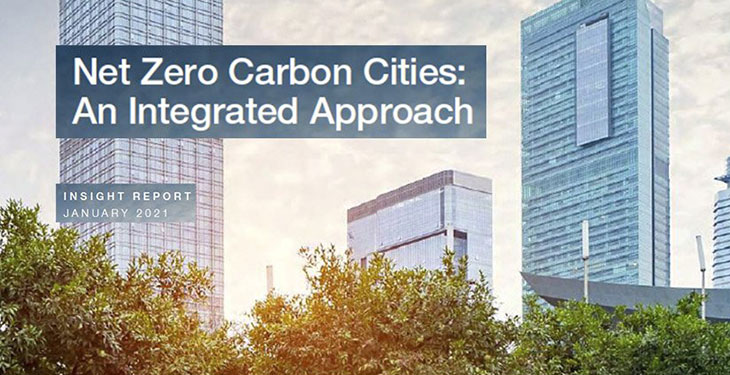Schneider Electric, the Enel Group and the World Economic Forum (WEF) have published the first deliverable of the “Net Zero Carbon Cities – Systemic Efficiency Initiative” – a global framework setting the vision to accelerate the decarbonization and resiliency efforts in cities around the world.
Entitled “Net-Zero Carbon Cities: An Integrated Approach”, and developed in collaboration with the WEF, the report outlines the need and benefit deriving from an integrated energy approach in planning and managing buildings, mobility, leveraging on a digitalized and intelligent grid infrastructure in an urban context.
Cities today account for nearly 70% of global carbon emissions and consume 78% of the planet’s energy, making such an approach critical to reaching the goal of limiting the rise in global temperatures to 1.5⁰C above pre-industrial levels.
“The COVID-19 crisis has reinforced the importance of global partnerships as we strive to make our cities and societies more sustainable, inclusive and resilient,” said Jean-Pascal Tricoire, Chairman and CEO of Schneider Electric. “Curbing emissions from the world’s cities requires urgent action, and it is an ambition that will need alignment of all stakeholders, both public and private actors, companies and citizens. This report outlines the ways in which systemic efficiency can be realistically and practically achieved, and how each of us can play a part.”
“To ensure a successful energy transition, we must work together, calling on local and national public administrations, private sector players and civil society to take on the common agenda of reducing our emissions,” said Francesco Starace, CEO and General Manager of Enel Group. “Electricity has already proved to be the lifeblood of cities, and this will increasingly be the case as electrification grows around the world. As a global leader in the power sector, we want to contribute to the development of a sustainable urban vision for the future by working with global partners to integrate electrification, smarter digital technology as well as efficient buildings and infrastructure.”
The report was developed within the WEF’s Net Zero Carbon Cities – Systemic Efficiency Initiative, co-chaired by Mr. Tricoire and Mr. Starace. Since the initiative’s launch a year ago, Schneider and Enel have been working with the community to accelerate the transition to net-zero carbon emissions in 100 cities by 2030.
It articulates the need for an integrated approach to improving energy productivity, electrifying transport, decarbonizing heating and cooling systems, as well as enabling demand-side flexibility, in addition to providing concrete recommendations and instructive experience-sharing around these concepts. Mr. Tricoire and Mr. Starace are also to illustrate these ideas during the panel for Building “Net-Zero” Cities, which will be held on Monday January 25th, 10:00-11:00 CET (The Davos Agenda).
The framework paper – as the first deliverable of this cooperation – is kicking off a list of future deliverables, among them; toolkits, interactive digital platform and building & cities metrics to measure the progress of cities towards a green and sustainable transition. Each deliverable will be the result of a close collaboration between major cities and several mayoral networks, as well as high-level representatives from academia, non-governmental organizations, industry and finance.
